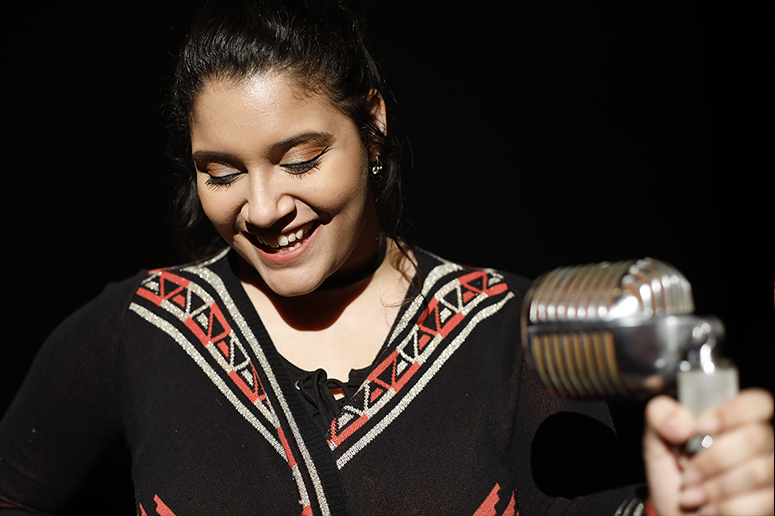Meet the Interns
These students are claiming their places in the workforce — interning in the industries they one day hope to…
Read The StoryDelaney Barker ’20 might never have auditioned for Kenyon’s stand-up comedy group, Two Drink Minimum, if the Cincinnati native hadn’t been passed over for the “funniest girl” senior superlative in her high school yearbook. Since then, she has become a regular at the comedy troupe’s Peirce Pub performances, even landing the opportunity to open for one of her favorite comedians, Tig Notaro, at an all-campus event.

A political science major, Barker is just as comfortable discussing the comedic styles of Bo Burnham and John Oliver as she is the philosophical questions explored by Aristophanes. We asked this smart jokester some questions about her funniest professors, favorite classes and comic influences.
1. Why did you choose to major in political science?
In the months leading up to the 2016 presidential election, I was in my first year at Kenyon and very focused on politics. I read Politico and listened to “Pod Save America,” and realized how fulfilling that was and how it made me feel like I had a purpose. Being informed helped me talk about the election with my peers and better understand what was going on around me.
2. How did you talk about the election in your classes?
We didn’t talk about the election necessarily in political terms, but about the people who did not benefit from the globalization that had been happening up until that point and how that motivated their vote.
3. What role can comedy play in today’s political climate?
I think programs like the “The Daily Show” and “Last Week Tonight” help to make politics more accessible. Viewers can laugh at the material while learning about what’s going on around them.
4. How does your study of political science influence your comedy?
I find myself really loving the work of Aristophanes because of the way he explored deep philosophical questions about politics in his comedy. We read his play “Congresswomen” during my “Quest for Justice” class. While today’s comedians tend to tell their audiences exactly what’s going on, Aristophanes talked about broader issues, like direct democracy, equality and communism. He made people think about the structure of their government, and not just what was going on in it.
5. How have you developed as a writer here?
In my analytical writing course, I learned that one of my weaknesses was not trusting my reader enough, so I am working on leaving out information while retaining the meaning of the piece.
6. How does being a better writer make you a better comedian?
Every single word matters. Sometimes just changing out a word or getting rid of a line can make a joke funnier. And changing the way you deliver lines, even if it’s just emphasizing a different syllable, can make all the difference.
7. Who do you think is the funniest professor at Kenyon?
Professor Andrew Engell in psychology. I am convinced he does stand-up in his free time. And Professor Jay Corrigan in economics. One of my favorite jokes that Professor Corrigan told was while we were working on a supply and demand graph in our microeconomics class. Someone asked why we focused on where the lines cross, because sometimes they don’t, and he said, “Because it’s graphically convenient. And I don’t mean any offense, but some of my best friends are graphically inconvenient.”
8. How would you describe Kenyon students?
Kenyon students are funny. There’s so much room on this campus to be yourself and not care about the judgment of other people.
9. What’s the most interesting course you’ve taken outside your major?
I took “Intro to Film” to satisfy my fine arts credit, and learned how to tell stories visually, and not just with words. I also received advice from Professor Jon Tazewell about how to conduct an interview on camera. He told us to make a list of questions we wanted to ask before the interview, and then throw it away. That way, we’re not focused on getting to all of the questions on our list, but really listening to what the person is saying and where they want the conversation to go.
10. What do you want to do after Kenyon?
I want to go to law school and study civil rights law. Last summer, I worked with Professor Ric Sheffield on his research about voting laws in Ohio in the late 1800s, and it was so interesting. I’ve actually known I’ve wanted to be a lawyer since the fifth grade. My mom sent me to school once in a tan corduroy pantsuit. I don’t know why she thought that was OK. But then my classmates joked that they wanted to hire me as their lawyer. So, I started representing people in friendship disputes.
These students are claiming their places in the workforce — interning in the industries they one day hope to…
Read The StoryGo behind the music with Nick Petricca '09 of Walk the Moon, which launched at Kenyon.
Read The StoryPhotographers document 24 uninterrupted hours of life on the Hill.
Read The StoryPolitical photojournalist Erin Schaff '11 tells the stories behind her headline-making images.
Read The StoryKenyon professors shed light on some questions that won’t leave us alone.
Read The Story